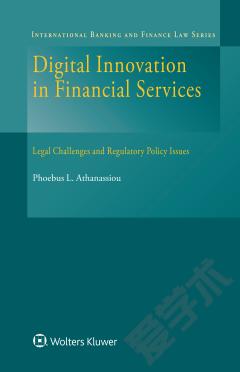Digital Innovation in Financial Services —— Legal Challenges and Regulatory Policy Issues
----- 金融服务业的数字化创新
Consumer behaviour is rapidly trending towards the use of digital devices as instruments through which to transact day-to-day business. This original and timely book shows how this trend creates new opportunities not only for retail consumers but also for financial service providers, regulators and central banks. The author offers a comprehensive overview of these opportunities and their countervailing legal and regulatory challenges.The author describes and analyses in unprecedented detail the application of digital financial innovation (FinTech), and some of its core manifestations, including virtual currencies, Blockchain and distributed ledger technologies to the delivery of financial services, in areas such as:– payments;– securities clearing and settlement;– central banking;– real-time access to financial information; – instant completion of core financial transactions;– data validation and reconciliation processes; and– digital contracting (smart contracts).Also clarified are the legal and other barriers to be overcome – including cybersecurity and risks to privacy – before any widespread adoption of digital innovation in the highly regulated financial sector context can occur.As an informed assessment of the legal merits and risks of technological innovation for financial service providers and central banks, and as a contribution to establishing a conceptual framework within which to analyse and better understand the applications of digital innovation to the financial sector, this practical work is bound to be welcomed by legal practitioners and legal scholars alike with an interest in financial services. Policymakers and regulators will also appreciate its guidance on how to temper the less benevolent aspects of FinTech with targeted, risk-focused regulation, so as to promote innovation and preserve the potential benefits for financial markets and their participants alike.
{{comment.content}}








 京公网安备 11010802027623号
京公网安备 11010802027623号